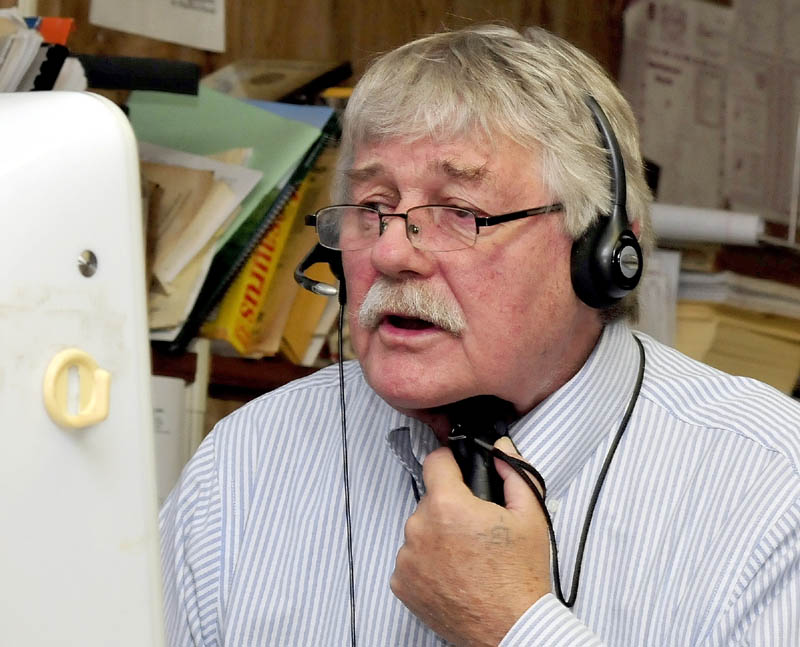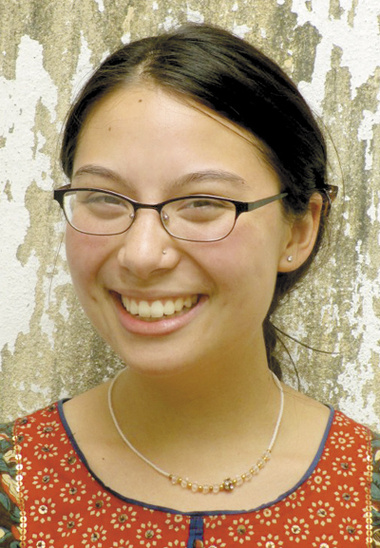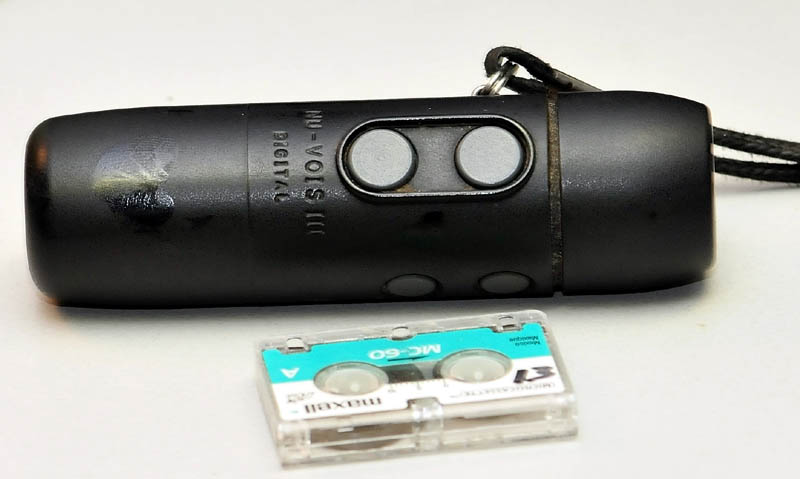SKOWHEGAN — About six months ago, Morning Sentinel reporter Doug Harlow got a phone call from a documentary journalism student who was inspired by an article he wrote.
Emily Kwong, 23, a student at the Salt Institute for Documentary Studies in Portland, read a news story about a Maine filmmaker who lost his work in a barn fire, and called Harlow to see if he could help her get in touch with the filmmaker.
Their conversation led her to another story, “Parts of Speech,” which is about Harlow’s life, including the loss of the reporter’s voice to throat cancer and how he learned to use an electronic device to help him speak.
The seven-minute radio documentary was selected as one of nine winners at the Third Coast International Audio Festival and will be recognized this weekend in Chicago before being broadcast nationally along with the other winners of the festival, which this year received 269 entries from 14 countries.
“Doug was such an interesting character and he was shown really sympathetically through the use of his electronic voice. We really got to know him through the story, which created great respect for the character,” said Julie Shapiro, Third Coast artistic director. “Our judges just fell in love with him.”
Kwong, who is an intern for two radio programs in New York City, produced the piece while a student at the Salt Institute in Portland last spring. Founded in 1973, the institute provides semester-long programs in documentary writing, radio, photography and multimedia to graduate and undergraduate students.
Kwong’s documentary opens with a recording of Harlow’s voice after he was diagnosed with throat cancer but before doctors removed his vocal cords in July 2005.
In the recording, he tells his wife and children that he loves them. Then the story jumps eight years — Harlow’s cancer is gone but surgeons had to remove his larynx and gave him an electrolarnyx, a battery-powered device he wears on a cord around his neck and holds against his throat to speak. He says he refused to give up on life, learned how to use the device and went back to work.
The piece tells of the first time Harlow went out in public with the voice and his return to work five weeks after the surgery. Colin Hickey, a reporter who worked with Harlow at the time of the surgery, said it was difficult for Harlow to return to work as a reporter, because people would hang up the phone when they heard the electronic voice.
Harlow’s wife, Mary Lou, who is also interviewed, said his cancer and the loss of his voice changed the way he related to people, including her.
“I’m still talking the way I spoke when he had a voice. It’s something I try to keep in mind — giving him the opportunity to be heard. Like in an argument, I have to give him the chance to argue back because I can get louder than what he can,” she tells Kwong.
It has been eight years since the surgery, but using the voice is still frustrating at times, said Harlow.
Kwong said when she first pitched her idea to him, he wasn’t sure whether he wanted to be the subject of a radio documentary.
“I said, ‘Well Doug, I think that you being a journalist all this time it might be interesting for you to see what it’s like on the other side,’” said Kwong. She said she also believed that Harlow, who has worked a reporter at the Sentinel for 25 years, had an interesting life and that this would be a good opportunity for him to tell his story.
Harlow lived in Boston during the 1960s and 70s, working as a cab driver, street poet and at the Unicorn coffee house. He covered the punk rock movement for a now defunct weekly paper, Timestream, in the early 1980s; and wrote for Art Zone magazine.
When the coffee shop closed, Harlow traveled between Boston, where he made the money he needed to travel, and Europe and north Africa. In 1979, he met Mary Lou and they settled in the Somerset County town of Athens in 1986.
Many of those details are not included in the documentary, although Kwong said they are some of the first things that intrigued her about Harlow.
She instead, at the encouragement of her Salt Institute editor Michael May, focused her story on his struggle to speak with the electrolarynx, because speech is a critical part of radio journalism.
Radio allowed Kwong to capture volume, inflection and even what it sounds like for Harlow to laugh with the electronic voice, all things he had to relearn after his surgery.
“It’s such a great story to do on the radio because it’s about Doug’s voice and it’s that much more visceral to hear him using his electronic voice. I just think that if you did this as a print piece it wouldn’t be as powerful as it is,” said May.
Kwong visited Harlow at his home, met his family and visited him in his office in Skowhegan while reporting the story.
“We kind of developed this relationship over the course of a few weeks and while I’m the person winning this award, Doug was the reason why the piece was successful. He’s just that interesting and generous of a person. I just had to be open to the opportunity to get to know him,” said Kwong.
In addition to “Parts of Speech,” there are two other pieces produced by former Salt Institute students that were winners at the festival, said May.
Mooj Zadie worked on the piece “Jack and Ellen” for Love + Radio and Courtney Stein was a co-producer of “The Modern Scarlet Letter A” on WNYC’s show Radio Rookies.
Kwong’s piece is unique, however, in that it was produced at the Salt Institute, he said.
On Sunday, three grand prize winners will be announced from among the nine festival winners. The results will be posted live on Twitter and the public will also have a chance to listen to all nine winning pieces during a national broadcast later this fall. Shapiro said a date for the broadcast hasn’t been chosen yet but when it does air it will potentially be listened to be thousands of people around the country on the Public Radio Exchange, a national public radio station.
“For the piece to resonate like this and be distributed nationally means a lot to me but my hope really is that it means something to Doug,” said Kwong. “Not only has he succeeded in living his life, but he went beyond what anyone could have expected and it’s worthy of some kind of admiration.”
Rachel Ohm — 612-2368
rohm@centralmaine.com
Send questions/comments to the editors.







Success. Please wait for the page to reload. If the page does not reload within 5 seconds, please refresh the page.
Enter your email and password to access comments.
Hi, to comment on stories you must . This profile is in addition to your subscription and website login.
Already have a commenting profile? .
Invalid username/password.
Please check your email to confirm and complete your registration.
Only subscribers are eligible to post comments. Please subscribe or login first for digital access. Here’s why.
Use the form below to reset your password. When you've submitted your account email, we will send an email with a reset code.